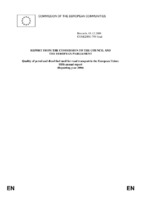REPORT FROM THE COMMISSION TO THE COUNCIL AND THE EUROPEAN PARLIAMENT Quality of petrol and diesel fuel used for road transport in the European Union: Fifth annual report (Reporting year 2006).

COM Document
Συγγραφέας
EU Commission
Ημερομηνία
2008-12-01Προβολή/
Θεματικές επικεφαλίδες
Transportation policy ; Transportation roadΠερίληψη
Directive 98/70/EC1 sets minimum specifications on health and environmental grounds for fuels to be used for vehicles equipped with positive-ignition and compression-ignition engines. Fuel quality is environmentally important because it affects engine pollutant emissions and thus air quality. It also affects the ease and cost with which desired pollutant and greenhouse emission limits can be achieved by manufacturers. Directive 2003/17/EC2, amending Directive 98/70/EC, requires a further reduction of the sulphur content of petrol and diesel fuels. Non-respect of the fuel specification can lead to increased emissions (for example excess oxygenates can increase NOx emissions) and might damage engine and exhaust after-treatment systems (for example excess sulphur damaging catalysts) leading to higher air pollutant emissions. In order to ensure compliance with the fuel quality standards mandatory under this Directive, Member States are required to introduce fuel quality monitoring systems. Article 8 of Directive 98/70/EC requires the Commission to publish annually, a report on fuel quality in the Member States. This fifth Commission Report summarises Member States’ submissions on the quality of petrol and diesel, as well as the volumes sold, for the year 2006. All Member States except Malta submitted national reports for 2006. The monitoring of fuel quality in 2006 shows that the specifications for petrol and diesel laid down in Directive 98/70/EC are in general met and again few exceedances were identified. For petrol the main parameters where exceedances were identified were research/motor octane number (RON/MON)3, summer vapour pressure4 and distillation/evaporation at 100/150°C5 For diesel the main parameters where exceedances were identified were sulphur content, distillation 95% point, cetane number and density. Although several Member States reported non-compliant samples, in general fewer samples exceeded the limit values (and the limits of tolerance for the test methods) compared to previous years. Several of the new EU10 Member States previously reported significant numbers of samples non-compliant with limit values, but the number of non-compliant samples they reported has reduced significantly in 2006. Belgium reported a higher proportion (~3.5%) of non-compliant samples than other Member States in 2005 (though improved on previous years), however insufficient detail has been provided in 2006 to gauge actual non-compliance numbers. Sulphur content for diesel was a particular problem in previous years (mainly for EU-10), due to the new mandatory <50 ppm level from the start of 2005. However, this problem appears to have been resolved in 2006. The Commission is not aware of any negative repercussions on vehicle emissions or engine functioning related to these exceedances, but continues to urge Member States to take action in order to ensure full compliance. Most are doing so already, and details of action taken by Member States with regard to non-compliance are included, where provided, in the individual country chapters of the detailed report for 20066. The Commission will continue monitoring compliance with the fuel quality requirements laid down in the Directive. For the abatement of air pollution and the introduction of new engine technology it is important to note that the share of <10 ppm and <50 ppm sulphur fuels increased significantly from 2001 to 2006 for EU-15. From 2005, it was mandatory for all fuel to meet the <50 ppm sulphur level, and for fuels of <10 ppm sulphur to be introduced in all Member States.
